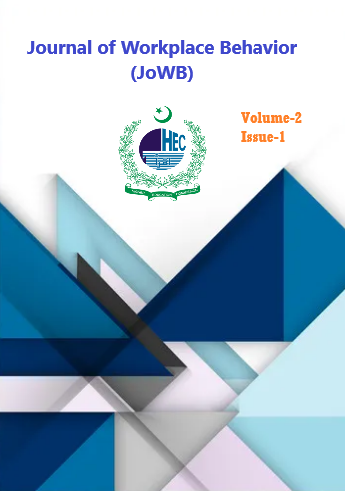The Role of Independent Self-Construal in Building Cohesiveness among Employees in Deleterious situation
Main Article Content
Abstract
Working in a team cohesively is considered a key attribute in the contemporary environment. Project organizations are keenly concerned about project success and largely depend on the timely transition to various stages for project success. Team cohesiveness of all group members plays a pivotal role in project performance and completion. This study primarily examines the role of leader-member exchange differentiation towards team cohesion with mediating the role of relationship conflict. The basic premise rests with the assumption that the high leadermember exchange differentiation from project leaders causes relationship conflict among group members which further results in team disintegration. Moreover, the moderating role of self-construal was also examined on the mediated relationship. Assumingly the mediated relationship would have been weak for independently self-construed employees. A sample of 309 employees was collected using a questionnaire survey. The data was collected in threetime lags to control method bias from project organizations operating in construction, IT, development, capacity building, energy, and some other sectors. Results revealed a highly negative relationship between leader-member exchange differentiation and relationship conflict. A positive relationship was found between relationship conflict and team cohesion. In sum, the mediating role of relationship conflict was observed. Self-construal also showed strong moderating effects on various relationships hypothesized for the model. It shows that when leaders follow varying degrees of relationships with followers, it causes interpersonal conflicts among followers and with leaders as well. The relationship conflict results in opposing thoughts and behaviors without any group harmony. However, employees with strong self-belief, fully determined and passionate, avoid paying attention to any of the adversities and work diligently for group purposes. Discussions, conclusions and implications of the study are presented based on the results.
Article Details
References
Adams, J. S. (1965). Inequity in social exchange. In Advances in experimental social psychology (Vol. 2, pp. 267-299): Elsevier.
Anand, S., Vidyarthi, P., & Rolnicki, S. J. T. L. Q. (2018). Leader-member exchange and organizational citizenship behaviors: Contextual effects of leader power distance and group task interdependence. 29(4), 489-500.
Aslam, U., Ilyas, M., & Imran, M. K. J. J. o. O. C. M. (2016). Detrimental effects of cynicism on organizational change: an interactive model of organizational cynicism (a study of employees in public sector organizations).
Back, K. W. J. T., & communication, e. i. s. (1950). The exertion of influence through social communication. 21-36.
Bagozzi, R. P. (1981). Evaluating structural equation models with unobservable variables and measurement error: a comment. In: SAGE Publications Sage CA: Los Angeles, CA.
Bai, Y., Han, G. H., & Harms, P. J. J. o. B. E. (2016). Team conflict mediates the effects of organizational politics on employee performance: A cross-level analysis in China. 139(1), 95-109.
Black, J., Kim, K., Rhee, S., Wang, K., & Sakchutchawan, S. J. T. P. M. A. I. J. (2019). Selfefficacy and emotional intelligence: Influencing team cohesion to enhance team performance.
Blau, P. (1964). 1964 Exchange and power in social life. New York: Wiley.
Boulding, K. (1963). Conflict and Defense: a general theory. In: Harper & Row, Publishers, New York.
Bradley, B., Liu, H.-h., & Zhang, X.-a. (2020). Look on the Bright Side of Task Conflict: Leader Member Exchange Differentiation & Team Performance. Paper presented at the Academy of Management Proceedings.
Burford, L. D. (2012). Project Management for Flat Organizations: Cost Effective Steps to Achieving Successful Results: J. Ross Pub.

